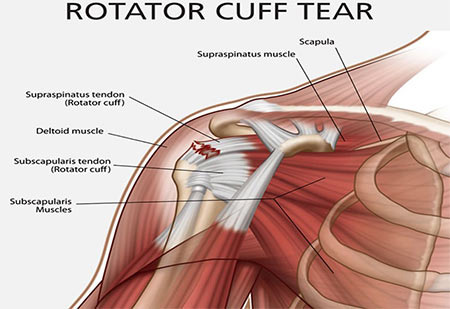 Midtown Manhattan
36 W 44th St Ste 1416 New York, NY 10036
Midtown Manhattan
36 W 44th St Ste 1416 New York, NY 10036
- (212) 621-7746
- text us
- BOOK ONLINE Call for Same Day Appointments
 Midtown Manhattan
36 W 44th St Ste 1416 New York, NY 10036
Midtown Manhattan
36 W 44th St Ste 1416 New York, NY 10036
Symptoms of a rotator cuff tear are noticeable due to the popping sound you hear when it happens — or because of the pain, you feel from the injury. You may also need treatment after years of abuse that eventually wears down the tendons in your shoulder until they just give out. Rely on your New York City sports medicine doctor for the best treatment for rotator cuff tear pain. Come to our sports injury clinic to get your pain evaluation and treatment. Meet our rotator cuff tear doctor Febin Melepura M.D. who is among the best specialists in NYC.
 Wear and tear are the most common culprit of rotator cuff injuries. Getting older increases your chances of developing a rotator cuff injury. It’s pretty common for people over 40 to have shoulder pain to due rotator cuff damage. But a tear to your rotator cuff can happen at any age.
Wear and tear are the most common culprit of rotator cuff injuries. Getting older increases your chances of developing a rotator cuff injury. It’s pretty common for people over 40 to have shoulder pain to due rotator cuff damage. But a tear to your rotator cuff can happen at any age.
Symptoms of a rotator cuff tear can include pain from one or more of the tendons in the joint. These tears are painful and prone to cause an array of medical symptoms that include loss of function and strength. Seek treatment from our sports medicine doctor as soon as you suspect the injury.
Your shoulder is a complicated joint that has a full range of motion. For this to happen, your shoulder must be able to move in multiple ways, the result of the many parts and pieces working together so you can move without problems or pain. Some of these pieces and parts are intricate and complex.
Your rotator cuff is made up of a group of tendons and muscles that hold your upper arm safely inside your shoulder socket. These muscles and tendons form a cuff. They’re the same parts that give you all the strength and mobility you need to play a multitude of sports, work out with weights, perform a wide range of jobs and just lift and rotate your arms.
A rotator cuff tear can occur suddenly after a fall or from trying to lift something that was entirely too heavy. But it doesn’t necessarily have to be the result of traumatic injury. Repetitive motions are another leading contributor to rotator cuff injuries. They can also come from normal wear and tear —one of the many challenges of the natural aging process. In some cases, you may not even feel the symptoms of a rotator cuff tear.
There are two types of rotator cuff tears:
I had a great experience here, Dr Melepura was super friendly and professional and even offered to see me pretty late on a Friday night with almost no notice when I was having serious pain and needed a procedure done.
Orion Schelz '17Symptoms of a rotator cuff tear can be subtle and difficult to notice, or they can be excruciating to the point of keeping you out of work and away from the activities you love. Symptoms include:
Traditional rotator cuff tear treatment typically depends on how bad your tear is. Typically, your doctor wants to begin treatment with a combination of physical therapy to strengthen your shoulder muscles and medications to ease your pain and reduce swelling.
Treatment for rotator cuff tears when you only have a partial tear may simply consist of lots of rest for your injured shoulder. In minor and less severe cases of this nature, anti-inflammatory medications and physical therapy play vital roles. But treatment for rotator cuff tears that are more severe or complete normally involves a minor surgical procedure to either:
Your pain management physician may have to remove small pieces of tendon or bone to encourage a better range of motion. Unfortunately, there’s a pretty big risk of re-tearing your cuff after surgery because the area tends to be weaker. More common surgical procedures for rotator cuff tear treatment include:
Recovery from treatment for rotator cuff tears isn’t nearly as bad as you may expect. If surgery is necessary, you’ll need to wear a sling for a couple of weeks. And our pain management team provides you with a list of activities to avoid and recommendations for exercise to do that speed your recovery along.
Do you have any questions about the rotator cuff tear treatment? Would you like to schedule an appointment with the best-rated doctor Febin Melepura MD of New York sports pain management clinic? Please contact our office for a consultation with the top pain relief specialist in Midtown Manhattan.

Febin Melepura, MD is a top rated, best in class interventional pain management doctor. He is a nationally recognized pain relief specialist and is among the top pain care doctors in New York City and the country. He is an award winning expert and contributor to a prominent media outlets.
Dr. Febin Melepura has been recognized for his thoughtful, thorough, modern approach to treating chronic pain and, among other accolades, has been named a “top pain management doctor in New York”, and one of “America’s Top Doctors™” for an advanced sports injury treatments.